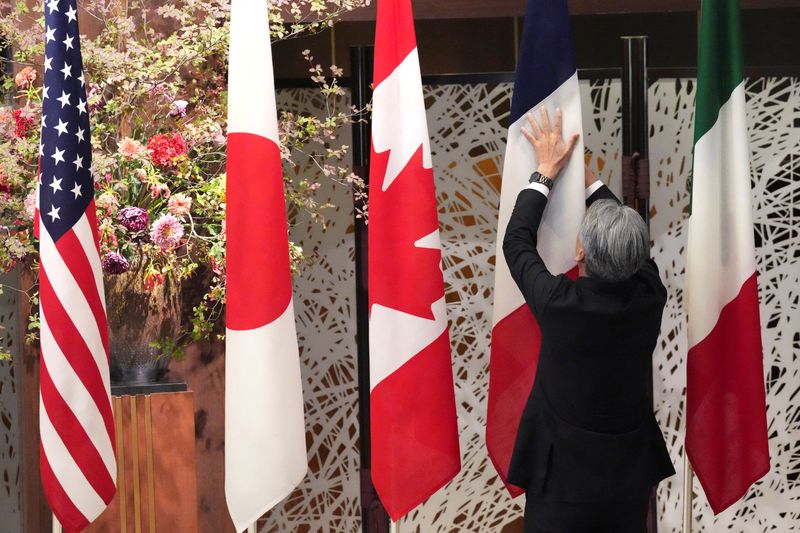
© Reuters. FILE PHOTO: A member of staff arranges national flags prior to a group photo session during the G7 Foreign Ministers’ Meeting at the Iikura Guest House Wednesday, Nov. 8, 2023, in Tokyo, Japan. Eugene Hoshiko/Pool via REUTERS
By Andrea Shalal
CHRISTIANSTED, St. Croix (Reuters) -G7 leaders will discuss a new legal theory that would enable the seizure of $300 billion in frozen Russian assets when they meet in February, two sources familiar with the plans and a British official said on Thursday.
U.S. and UK officials have worked in recent months to jumpstart efforts to confiscate Russian assets immobilized in Belgium and other European cities, and hope Group of Seven leaders agree to issue a stronger statement when they meet in late February, around the second anniversary of Moscow’s invasion of Ukraine, the three sources said.
The discussion takes place as U.S. President Joe Biden faces Republican opposition to his request for another $61 billion in aid to Ukraine, with U.S. officials warning of dire consequences for the Ukraine war effort.
The United States, backed by the UK, Japan and Canada, has proposed that G7 working groups develop options for G7 leaders, the sources said, but cautioned against expecting “an actual announcement” about asset seizures at the late February meeting.
The new legal theory would allow asset seizures in “very specific circumstances” involving an aggressor country, one of the sources said.
“The U.S. has been able to develop a legal theory for how Russia could be held accountable that we think will be held up internationally in the courts and will be widely recognized as legitimate,” the source said.
No decisions had been made, and several countries – including the United States and Britain – would require legislative changes to establish the needed authorities to carry out such seizures, two of the sources said.
The Financial Times reported earlier Thursday that Washington had proposed setting up three working groups to examine the legal issues around confiscation; the method of applying such a policy and mitigating risks; and options for how to best channel the support to Ukraine.
G7 leaders have long argued that Russia is obligated under international law to end its war and pay for the damage it has caused, which already exceeds $400 billion dollars, according to the World Bank.
In a Dec. 6 statement, G7 leaders said they would “explore all possible avenues to aid Ukraine in obtaining compensation from Russia, consistent with our respective legal systems and international law” and directed their relevant ministers to continue working on the issue.
One of the sources said there was still more work to be done, including convincing other countries to join in.
“This is something that the international community would need to collectively do in order to ensure it can be done effectively,” the source said, adding that some countries would only proceed if all European countries signed on.
The Financial Times noted that some European countries, including Italy – which takes over the G7 presidency in 2024 – were wary, fearing the possible implications for financial stability as well as retaliatory action from Russia.
Moscow has already threatened to take retaliatory action against countries that seize its assets.
Source: Investing.com





























